Reader question: “How do I respond to a bad review?”
Bad reviews are the worst. You’re busy juggling client demands, admin tasks, and your personal life while genuinely trying to do a great job, then, out of nowhere, you get a bad review. It’s the last thing you need and an absolute downer. But, more importantly, it’s bad for business. Your leads and potential new clients are reading those reviews, just like you read reviews before you try a new restaurant, doctor, bourbon, or whatever. Even referrals are checking them before calling you.
But, if you handle it properly, a bad review isn’t a death sentence. A well-thought-out, polite response speaks volumes to who you are as a professional, and can mitigate a bad review (especially a crazy-sounding bad review). And, while you’re writing your response, remember, it’s more for potential future clients than it is for the reviewer. Set aside any hurt feelings and be exceedingly polite.
Part 1: answering a real review
Cool off: Don’t answer a negative review right away. Your business is your baby and you’re most likely some level of upset. No one has ever been perfectly eloquent and polite in the middle of a fight.
Don’t admit any wrongdoing: We all make mistakes and, when you’re in business long enough, you’re bound to make a few. But, don’t publicly admit to any wrongdoing because you don’t want future clients thinking that you frequently make mistakes (for example, would you go to a restaurant that publicly admitted they gave someone food poisoning?) Plus, your insurance isn’t going to like it if things go south.
Be sympathetic: You don’t necessarily need to apologize, but write your response in a sympathetic tone. For example, you’re sorry to hear you didn’t meet their expectations or that you didn’t meet the high standard you set for yourself. (And, if you are going to apologize, don’t cop out with an “I’m sorry you feel that way” or some other half-apology.)
Take it offline: Don’t air any dirty laundry in your response and bring up client info or project details because it’s unprofessional and potential new clients will think you regularly gossip about them. Try to take it offline. Ask them to contact you so you can resolve the issue.
Keep it short: A long response isn’t necessarily a better response. A longer response just gives you more room to put your foot in your mouth, say something that might turn off a potential future client, or admit wrongdoing.
Part 2: answering a fake review
Be blunt: While remaining polite, get straight to the point. Say in your review that you don’t have a record of doing business with them. (for example, ‘I’m sorry to hear this, but I don’t actually have a record of ever doing business with a John Smith. If I’m mistaken, please reach out so I can fix this. Feel free to call me at (###) ###-####’)
Report it: Reported reviews get taken down…eventually. After responding, report the review then ask your friends and family to report it as well. (And, send me the review too and I’ll report it.)
Part 3: additional strategies
Drowning it out: You can bury a negative review with lots of good reviews. A flood of positive reviews will increase your overall rating and make it harder to find the bad review. Start a review campaign and reach out to past clients asking them to leave an honest review. Don’t ask friends and family to post fake positive reviews. Fake reviews never sound right. And, it’s usually pretty obvious when a business has fake reviews.
Reaching out to the reviewer: I’m not a fan of reaching out. If they’re so upset that they’ve left a negative review, it may already be a lost cause. But, if you are going to reach out, be genuine. Try to fix the underlying problem they had with your service to win them back. And, don’t mention the review when you talk to them.
💪 What we do at Resting Business Face 😤
🚀 Finance Partner: Forecast the next 12+ months, improve your cash flow, and work closely with yours truly.
🤓 Hands-off Consulting: Annual forecasting and quarterly calls when you need just a touch of guidance.
🏛️ Tax Essentials: Taxes, accounting, and payroll to keep your business on the IRS's good side.
